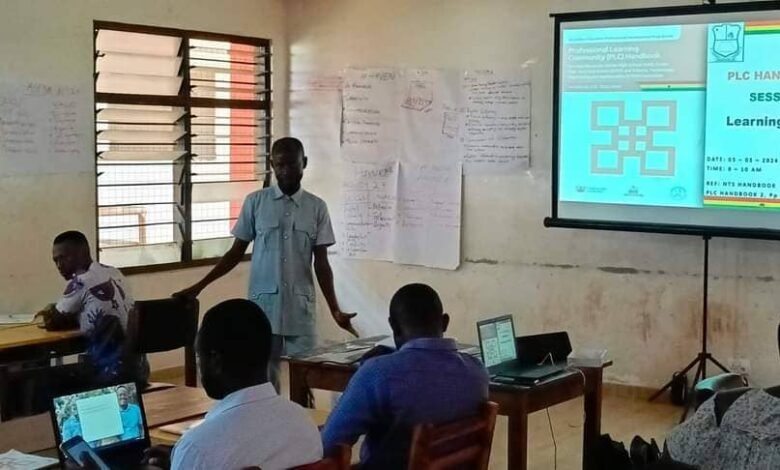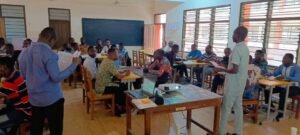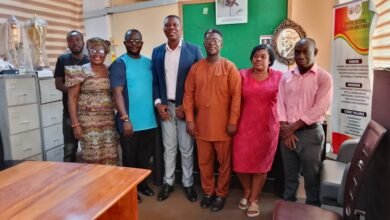Shambolic Professional Learning Communities (PLC) in Education: The Ghanaian Setting

In the midst of ongoing educational challenges, Professional Learning Communities (PLCs) for teachers have emerged as a beacon of hope for improving productivity and pedagogical efficacy. However, a stark reality persists as schools nationwide grapple with a shortage of basic resources crucial for effective lesson delivery.
PLCs, designed to foster collaboration among educators, have garnered attention for their potential to enhance teaching practices and student outcomes. These communities provide a platform for teachers to share insights, strategies, and resources, ultimately enriching the learning experience for students, empower teachers to adapt to evolving educational landscapes and meet the diverse needs of their students, bringing teachers together to share strategies and solve classroom challenges collectively, analysis students performance data to identify and address learning gaps, reducing teacher isolation and creating a network of mutual support and commitment to school improvement.

Amidst the educational landscape, the implementation of Professional Learning Communities (PLCs) in Ghana has stirred controversy, with critics denouncing them as superficial alterations masquerading as significant improvements. While touted as transformative, some argue that PLCs primarily entail semantic shifts in educational terminology rather than substantive changes in teaching practice.
Under the guise of PLCs, traditional educational terminology undergoes cosmetic modifications, with topics rebranded as strands, sub-topics as sub-strands, and objectives as learning indicators, among other semantic adjustments. While these changes may appear minor on the surface, they serve to obscure the lack of genuine innovation in pedagogical approaches.
Many teachers feel that PLC meetings have become repetitive and fail to introduce new strategies or insights. Instead of enriching professional development, these sessions often involve reading existing materials without adding substantial value. There is a perception that Head Teachers and other senior staff benefit financially from PLC training programs. This has led to skepticism about the true purpose of these initiatives, with some viewing them as a way for administrators to gain credit and funds rather than genuinely enhancing teaching practices. The strict enforcement of attendance, with penalties such as query letters for absences, creates a punitive atmosphere. This can lead to resentment among teachers who feel pressured rather than supported.
Despite the promising prospects of PLCs, schools in Ghana are facing a crisis of resources essential for day-to-day instruction. The absence of basic things such as plugs, bulbs, markers, and even chalkboards has become commonplace, posing significant challenges to educators striving to deliver quality lessons. In an era where technology is increasingly integrated into education, the absence of basic tools raises critical questions about the feasibility of certain pedagogical approaches.

One such question revolves around the necessity of mandating PowerPoint proficiency when projectors, a fundamental component for its use, are lacking in many schools including the so-called big schools. While digital presentations can offer interactive and visually engaging content, their utility is heavily dependent on access to requisite hardware. In the absence of projectors, educators are left with limited options for incorporating technology into their teaching practices, highlighting the urgency of addressing infrastructure deficiencies.
The juxtaposition of PLCs as a catalyst for professional growth and the scarcity of essential resources underscores systemic disparities within the education system. While initiatives like PLCs hold promise for advancing teaching practices, their effectiveness is compromised in environments where basic necessities are lacking. As policymakers and stakeholders seek solutions to enhance educational equity, addressing resource shortages must be prioritized alongside initiatives aimed at professional development. Many teachers believe that the introduction to PLC is an avenue that our system isn’t ready for.
Recommendations for Improvement
To address these issues and foster a more positive and productive environment for teachers, consider the following recommendations:
Meaningful Content: Ensure that PLC meetings are focused on substantive, innovative teaching strategies and solutions to real classroom challenges. This could involve inviting guest speakers, organizing workshops, or facilitating hands-on activities that directly benefit teachers’ instructional methods.
Teacher-Led Sessions: Empower teachers to lead PLC sessions based on their areas of expertise or recent successful experiences. This peer-led approach can make the sessions more relevant and engaging. What is the use of examples from Geography to a Social Studies or History teacher? Why put all General Arts teachers together during PLC?
Practical Applications: Focus on practical applications and real-world examples rather than theoretical discussions. Teachers should leave PLC meetings with actionable ideas they can immediately implement in their classrooms.
Acknowledge and Address Concerns: School leadership should acknowledge the concerns raised by teachers and work collaboratively to address them. This could involve conducting surveys to gather feedback and making adjustments based on the responses.
Voluntary Participation: Make participation in PLCs voluntary or provide incentives that recognize the additional effort without penalizing those who are unable to attend every meeting. This approach can reduce resentment and increase genuine engagement. Forcing teachers to learn things most consider irrelevant and unapplicable can only create resentment.
Transparent Communication: Communicate the goals and benefits of PLCs, and ensure that any financial incentives for administrators are transparent and justified in terms of the value they add to the educational process.In conclusion, the convergence of PLCs and resource scarcity underscores the complex challenges facing educators in their pursuit of excellence. As educators strive to innovate and collaborate within PLCs, it is imperative that they are equipped with the essential resources needed to translate their ideas into effective instruction. Only through concerted efforts to address systemic inequities can we ensure that all students have access to the quality education they deserve.
CC: Akwasi Adusei-Amofah
aamof02@gmail.com
Thank you for reading this article on GossipMotion.com, a premier news publishing website from Ghana. We appreciate your support and encourage you to share this article with your friends and family. Your engagement helps us continue to bring you the latest news and stories. Thank you!
"DISCLAIMER: Gossipmotion will respond to any and all take-down requests that comply with the requirements of the (DMCA). If you believe that a file that we uploaded to Gossipmotion infringes on your copyright then please contact jhuxtelloitech@gmail.com to submit a request."






